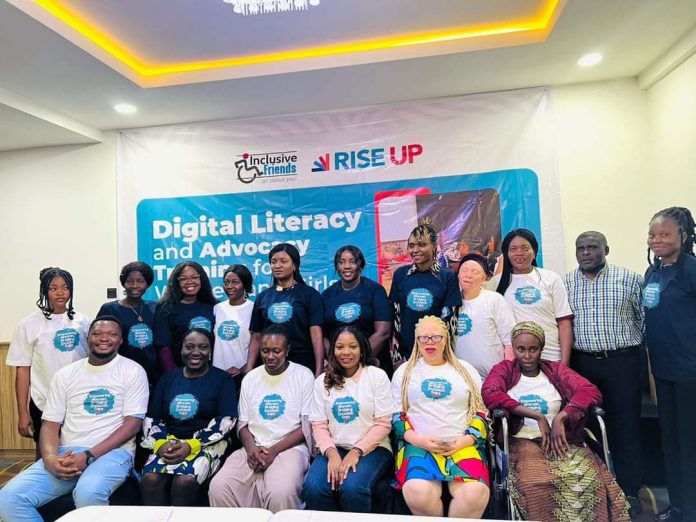The Inclusive Friends Association (IFA), a renowned non-profit organization championing the rights and inclusion of Persons with Disabilities (PWDs) in Nigeria, has once again emphasized the critical importance of digital literacy as a tool for empowerment and societal inclusion.
At a groundbreaking digital literacy and advocacy training held in Abuja for women and girls with disabilities, the Executive Director of IFA, Grace Jerry, underscored the transformative power of equipping marginalized groups with digital skills. Represented by the organization’s Project Coordinator, Mr. Stephen Idoko, Jerry described digital literacy not as a privilege but as a fundamental right.
Digital Inclusion: A Pathway to Empowerment
“In an increasingly digital world, access to technology and the skills to use it are no longer luxuries—they are necessities,” Jerry stated. “Women and girls with disabilities face compounded exclusion, which denies them the opportunity to fully participate in and benefit from digital innovation. This initiative aims to bridge the digital divide, empowering participants to advocate for their inclusion within Nigeria’s National Digital Literacy Framework.”
The training, attended by numerous women and girls with disabilities, offered insights into navigating the digital landscape, storytelling for advocacy, and strategies to champion digital inclusion. Participants were urged to leverage the knowledge gained to create meaningful change in their communities and challenge societal norms that perpetuate exclusion.
Empowering Through Advocacy and Solidarity
Adding her voice to the discourse, Rahila Joshua Dung, Programme Assistant at Rise Up Nigeria, spotlighted the broader challenges facing women and girls in Nigeria, particularly in the digital space. She highlighted systemic barriers such as patriarchy, poverty, and insecurity, which have long stifled women’s progress in education, health, and economic empowerment.
“Africa, especially Nigeria, operates within deeply entrenched patriarchal systems where women often lack decision-making power over their lives,” Dung remarked. “Poverty perpetuates cycles of disempowerment, while insecurity further restricts women from participating in community and societal systems. These barriers make the journey towards inclusion even more daunting for women with disabilities.”
Dung also pointed out emerging risks in the digital space, including cyberattacks and blackmail, which disproportionately affect women and girls. “The digital space, while offering immense opportunities, also presents unique risks for women and girls. Addressing these challenges requires collective advocacy, solidarity, and sustained action,” she stressed.
A Vision for Change
For the Inclusive Friends Association, the training was more than an educational initiative—it was a call to action. By equipping participants with digital tools and advocacy strategies, the organization aims to empower them to break barriers, challenge stereotypes, and demand inclusion in every sphere of life.
“This initiative is about more than learning; it’s about empowerment and action,” Jerry reiterated. “We are committed to fostering an inclusive society where digital literacy serves as a pathway to equal opportunities.”
The training also served as a platform to address gender justice, with Dung calling for targeted measures to support women and girls. She urged stakeholders to take deliberate steps to include women with disabilities in economic, health, and educational frameworks.
Participants Speak Out
Participants expressed their gratitude for the training, noting its potential to transform their lives and communities. Many highlighted the importance of storytelling for advocacy, a key aspect of the program, which will enable them to amplify their voices and share their experiences on a larger scale.
“This training has opened doors I didn’t even know existed,” said one participant. “I now feel equipped to use technology to tell my story and advocate for the rights of women and girls like me.”
Charting a Digital Future for Women with Disabilities
As the training concluded, the IFA reaffirmed its commitment to closing the digital divide and ensuring that women and girls with disabilities are not left behind. The event was a powerful reminder of the transformative potential of digital literacy and the collective efforts needed to create an inclusive society.
With initiatives like these, the Inclusive Friends Association is setting a benchmark for inclusion, proving that with the right tools, marginalized communities can thrive and contribute meaningfully to the nation’s development.


